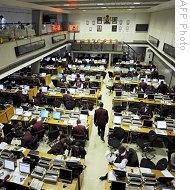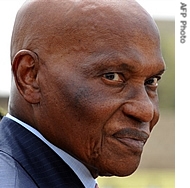-
(单词翻译:双击或拖选)
 |
| Stockbrokers6 do business on trading floor of Nigerian Stock Exchange in Lagos, 08 Oct 2008 |
African economists note that African financial institutions have, so far, been spared the market-shaking collapses7 seen in the developed world.
The head of Pan-African Capital Holdings in Johannesburg, Wiseman Nkuhlu, says this is because African banks have not engaged in high-risk lending as seen in the United States and Europe.
"The markets of African countries are not as sophisticated as the markets in the U.S. and Europe, especially when it comes to the securitization of mortgage bonds which is behind this crisis," said Nkuhlu.
The failure of mortgage bonds, or housing loans, due to rising interest rates in Western nations sparked the crisis.
Mortgage bonds are not common in most African nations. But Nkuhlu says the disruption they have caused may affect Africa's economic growth rate of five percent or more in many countries.
"This crisis is of great concern because it may result in increased risk averseness on the part of banks and reduced [investment] flows to the region. The flows that have been responsible for the high levels of growth may actually decline if the crisis continues," he said.
The director of Ghana's Development Policy Institute, Nii Moi Thompson, agrees, saying the effects of the global crisis on Africa are likely to be indirect.
"One of the more likely indirect effects is the decline in remittances8 to African countries as unemployment rises in North America, Europe and other places. Those Africans who live there and regularly send monies home are less likely to be in a position to send home these monies," he said.
In addition, he says as Western governments try to pay for their billion-dollar rescue packages they might reduce foreign aid programs. Private humanitarian9 groups, facing a drop in donations, might have to do the same.
Some experts worry that the crisis could delay large-scale agriculture and infrastructure10 projects and could even threaten social programs to improve health, education and sanitation11.
Nevertheless, the experts say there could be some positive effects. Thompson says interest rates will probably decline.
"As part of the effort to survive the crisis, these Western governments will have to keep interest rates down. So if that leads to lower debt servicing then that will be better for us," he said.
Another benefit could be lower prices for petroleum12, food and other basic goods due to a decline in demand.
South African economist2 Nkuhlu says he is optimistic that developed nations will remain committed to improving the quality of life in Africa.
"The commitments and the relationship between the developed world and Africa in particular has matured, reached a point where the commitments are likely to be sustained even while under these difficult circumstances, possibly at slightly reduced levels," he said,
Thompson says other benefits from the crisis are the lessons to be learned, especially from the structural13 adjustment programs that sought to reduce government's role in the economy and encourage free market reforms.
"The lessons are clear, that market forces can in fact be evil forces and it takes effective, responsive and competent institutions to contain them," he said.
But he cautions against excessive moves to reassert government involvement in the economy.
"We have been there before. But the problem was that we moved from one extreme to the other," he said. "There needs to be some sense of balance, some sense of moderation as to how far the markets should be allowed to go and how far the government can maintain some degree of oversight14 over the markets to ensure that they are productive without necessarily being destructive."
 |
| Senegalese President Abdoulaye Wade15 |
But the president of Senegal, Abdoulaye Wade, concluded that the crisis means little to the average African.
"Who cares if the bourgeois16 can no longer travel or live in comfort. The greatest menace to most Africans is hunger," he said. "The amount of investment needed to feed people and create jobs in Africa is a fraction of the money being spent on the global financial crisis."
 收听单词发音
收听单词发音
1
affected

|
|
| adj.不自然的,假装的 | |
参考例句: |
|
|
|
2
economist

|
|
| n.经济学家,经济专家,节俭的人 | |
参考例句: |
|
|
|
3
economists

|
|
| n.经济学家,经济专家( economist的名词复数 ) | |
参考例句: |
|
|
|
4
repercussions

|
|
| n.后果,反响( repercussion的名词复数 );余波 | |
参考例句: |
|
|
|
5
tighten

|
|
| v.(使)变紧;(使)绷紧 | |
参考例句: |
|
|
|
6
stockbrokers

|
|
| n.股票经纪人( stockbroker的名词复数 ) | |
参考例句: |
|
|
|
7
collapses

|
|
| 折叠( collapse的第三人称单数 ); 倒塌; 崩溃; (尤指工作劳累后)坐下 | |
参考例句: |
|
|
|
8
remittances

|
|
| n.汇寄( remittance的名词复数 );汇款,汇款额 | |
参考例句: |
|
|
|
9
humanitarian

|
|
| n.人道主义者,博爱者,基督凡人论者 | |
参考例句: |
|
|
|
10
infrastructure

|
|
| n.下部构造,下部组织,基础结构,基础设施 | |
参考例句: |
|
|
|
11
sanitation

|
|
| n.公共卫生,环境卫生,卫生设备 | |
参考例句: |
|
|
|
12
petroleum

|
|
| n.原油,石油 | |
参考例句: |
|
|
|
13
structural

|
|
| adj.构造的,组织的,建筑(用)的 | |
参考例句: |
|
|
|
14
oversight

|
|
| n.勘漏,失察,疏忽 | |
参考例句: |
|
|
|
15
wade

|
|
| v.跋涉,涉水;n.跋涉 | |
参考例句: |
|
|
|
16
bourgeois

|
|
| adj./n.追求物质享受的(人);中产阶级分子 | |
参考例句: |
|
|
|















